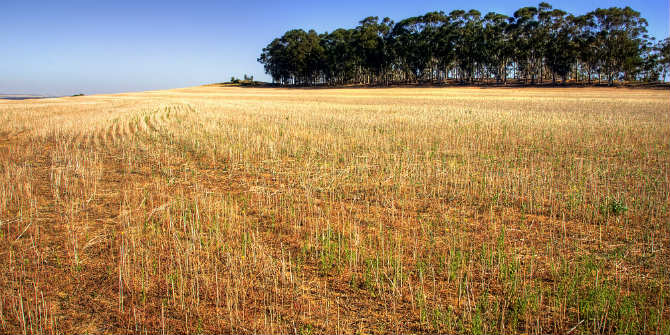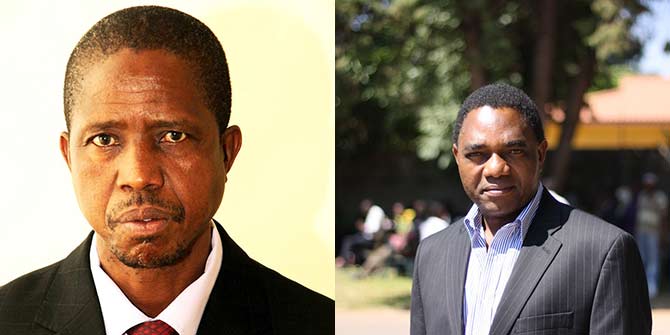A Pentecostal symposium and celebration will take place in London on Saturday 26 November 2016 profiling the diversity that exists in British Pentecostalism today. Almost seventy years after Windrush, Bishop Dr Joe Aldred argues that the symposium is a way to reclaim ground lost when White British Pentecostals failed along with the rest of the British church to welcome migrating Black Pentecostals and other Christians from Africa and the Caribbean.
Our Pentecostalism in Britain series is in collaboration with LSE’s Religion and the Public Sphere blog.
History of Pentecostalism
Pentecostalism is an early 20th Century expression of Christianity mostly associated with the work of African American William Seymour’s Azusa Street Revival movement. From his mentor Charles Parham, Seymour learnt and took the idea of baptism in the Holy Spirit resulting in spiritual renewal and empowerment to new heights. In the three years between 1906 to 1909 an improbable congregation led by Seymour, a one-eyed descendant of enslaved Africans, reported experiencing many of the miraculous phenomena that had marked the Church recorded in the book of Acts in the Christian Bible and the Holiness Movement from which the fledgling movement was being birthed. Speaking in unknown tongues, healings, trances, racial integration and visits from around the world as news spread were all in evidence at Azusa Street meetings.
The Holiness Movement can be described as a protest against the perceived lukewarmness of some of the very churches – Methodists, Baptists, Quakers – that were themselves the result of dissatisfaction with and protest against Roman Catholicism in the Protestant Reformation. The late Swiss theologian Walter Hollenweger shows that something approaching simultaneous combustion occurred with Pentecostalism springing up and spreading dynamically in various parts of the world, including Britain. We therefore find the presence in Britain of Pentecostalism expressing itself first among the Church of England and other established churches before morphing into such as Elim, Assemblies of God and the Apostolic Church since early 1900s.
Migration, racism and church
The religiosity of Africans at home and in the diaspora is well known, therefore Black people in Britain from the time of Hadrian’s Wall, slavery and the slave trade, and World Wars One & Two, will always have their fair share of religious adherents. Maybe it’s not surprising then that the arrival at Tilbury docks on 22 June 1948 of the SS Empire Windrush with 500 Caribbean, mostly Jamaican, migrants on board has led to a popular folklore that Pentecostalism in Britain is Black and that this religious expression started with their post-war arrival. The Windrush era since 1948 has indeed seen a near explosion of Black Christianity in Britain, which has had a profound effect on British society including the church.

Photo Credit: Creative Commons, Wikimedia: Royal Navy official photographer
Windrush era migration and settlement has brought to the fore both a black Christian presence in Britain and certain folklores. One such popular myth is that these migrants established their own mostly Pentecostal churches because they were excluded from British mainstream ones. A much truer narrative might be that migrants in the Windrush era travelled with their forms of Christians faith and practices including Pentecostalism. While those migrants belonging to mainline churches could easily find their churches, Pentecostals generally didn’t find theirs and so started them in living rooms, school and church halls.
The lukewarm often hostile reception accorded to migrant members of British mainline churches from back home, ensured that many responded by joining the Pentecostal churches that were being initiated. Stories abound about the many unsavoury and unchristian experiences of black Christians arriving in Britain and trying to take their places in the denomination they belonged to from home. Stories of white brothers and sisters refusing to sit in pews with black congregants. Stories of being told by the vicar, ‘your people meet down the road’, or, ‘I’d prefer if you didn’t come again’.
Pentecostalism today
In the 1960s and 1970s Black Pentecostal growth in Britain was mainly identifiable as Caribbean, but since the 1990s it is identifiably African, particularly Nigerian. Some have even referred to the nigerianisation of British Christianity. However, the growth of the likes of Kingsway International Church and Redeemed Christian Church of God should not obscure two facets of this Christian presence. First, historic white-led Pentecostals like Elim and Assemblies of God continue to thrive in Britain and around the world and are larger than any of the Black-led Pentecostal churches. Second, Pentecostalism in general constitute a minority of Christians in Britain and Black Pentecostalism in particular draws its support from a small percentage of British society that according to the latest census is less than 5% of the overall population. Growth, perceived as meteoric or not, among Black Pentecostalism in Britain draws from a shallow pool, and may now stands at a crossroads in terms of its mission remit.
An aspect of black and white Pentecostal relations that doesn’t seem to receive much attention is the missed opportunity that existed at the Windrush moment circa 1948. It is perfectly understandable that migrating Anglicans sought out the local Anglican Church, Methodists, Baptists Catholics et al did the same; but why didn’t migrating Pentecostals seek out Elim, Assemblies of God, et al to find Pentecostal expressions of worship close to what they were used to? The late Oliver Lyseight, credited with founding the New Testament Church of God in Britain in the 1950s tells of how he and others did worship with White Pentecostals. However, overall Black and White Pentecostals in the Windrush era fared no better than Black and White mainline churches did.
This week, a national symposium and celebration takes place in London. It represents a significant intercultural and ecumenical moment. For the past three years under the aegis of the national ecumenical organisation Churches Together in England, ethnic African, Caribbean and White British Pentecostals and Charismatics have been meeting under the chairmanship of a Pentecostal President, currently Bishop Eric Brown, former national presiding bishop of the New Testament Church of God. In a near act of redemption twenty national Pentecostal and Charismatic organisations now represent the broadest ethnic and denominational diversity that has ever been seen in Britain. In what may be interpreted by some as an act of reclamation the diversity of this Pentecostal gathering will go some way to reclaim ground lost when White British Pentecostals failed along with the rest of the British church to welcome migrating black Pentecostals and other Christians from Africa and the Caribbean. Almost seventy years after Windrush black and white Pentecostals will at last display a show of Christian solidarity that may lead to doing mission together.
Read other articles in the series
Bishop Dr Joe Aldred (@joealdred) is Secretary for Minority Ethnic Christian Affairs with Churches Together in England and is also a bishop in the Church of God of Prophecy. He is the author of Thinking outside the box on race, faith and life.
The views expressed in this post are those of the author and in no way reflect those of the Africa at LSE blog or the London School of Economics and Political Science.





